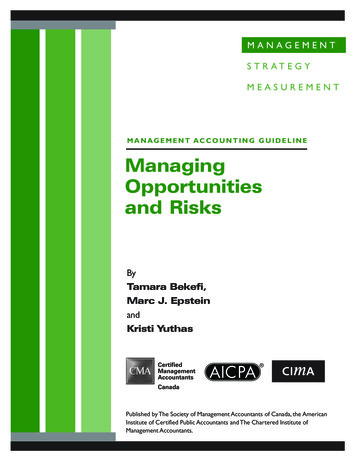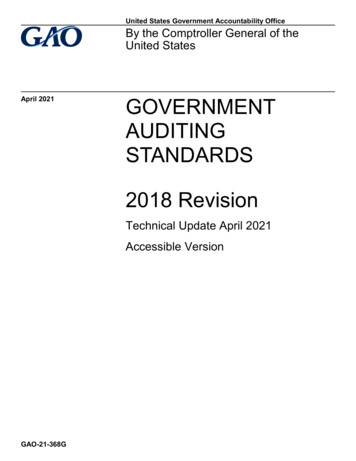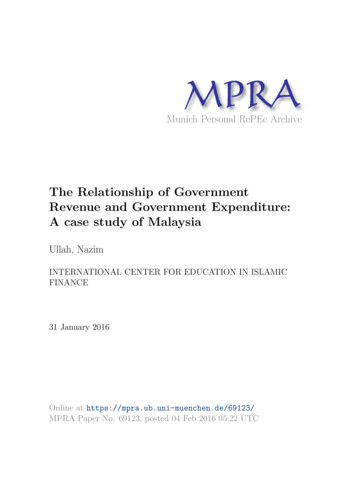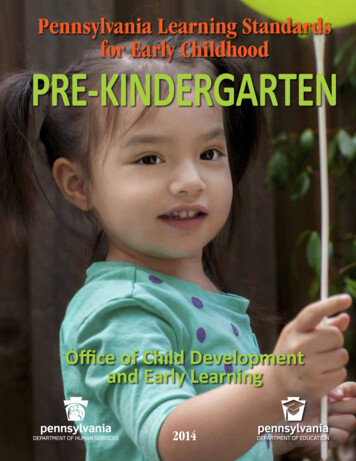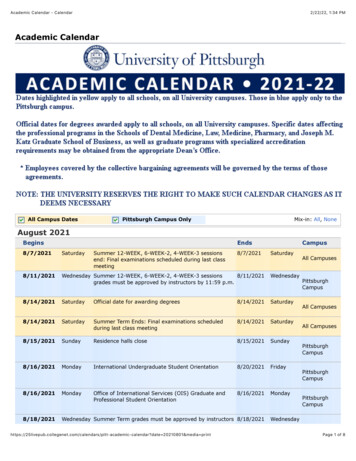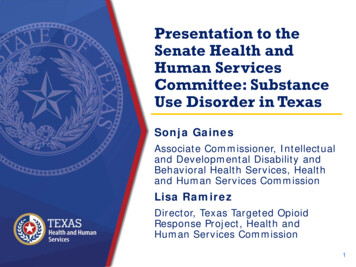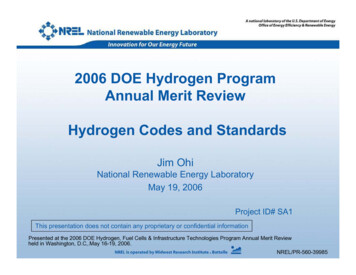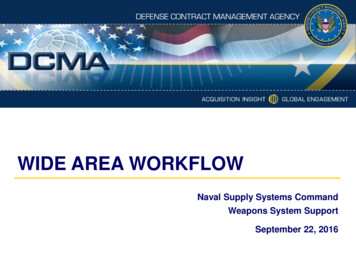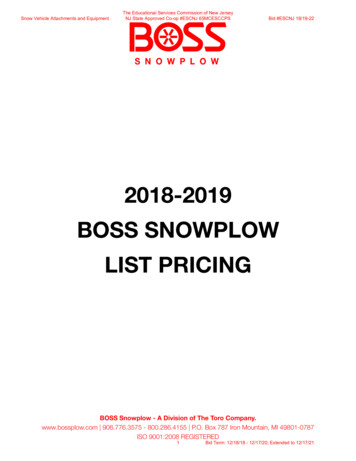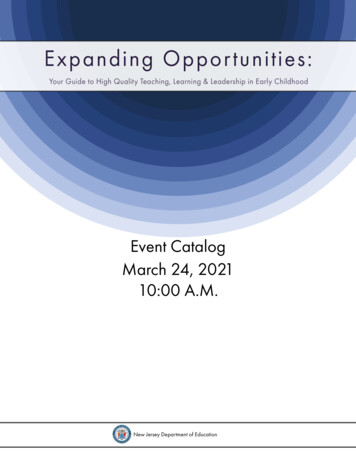
Transcription
Expanding Oppor tunities:Your Guide to High Quality Teaching, Learning & Leadership in Early ChildhoodEvent CatalogMarch 24, 202110:00 A.M.New Jersey Department of Education
Letter from the CommissionerMarch 24, 2021Welcome, and thank you for joining us for the New Jersey Department of Education’s ThirdAnnual Early Learning Virtual Conference: Charting the Road to High-Quality Early ChildhoodEducation. I appreciate your commitment to this work and the time you are investing to helpshape outcomes for New Jersey’s youngest learners.Our conference this year focuses not only on preschool education, but on the early elementarygrades to ensure that critical grade-to-grade transitions are more seamless and accessible to allstudents. As with our previous early learning conferences, there will be professionaldevelopment sessions designed to equip educational leaders in preschool programs with tools tokeep young minds engaged in learning. This year, we have expanded our conference offerings toinclude topics on leadership, fiscal management, supporting English Learners, and other areas ofimportance. Continuing the theme of access to high quality programs for all of our studentsremains at the forefront of this year’s conference.Three years ago, when we held our first virtual early learning conference in partnership with theLong Branch School District, we were excited to facilitate professional engagement for educators.Fast forward to today and we continue to highlight the Long Branch School District for itsleadership in providing families with high-quality early childhood education.It is critically important to ensure that our youngest learners continue to receive the top-tiereducation that is expected from New Jersey’s public schools. We’ve learned that the best way toachieve this is to promote conversation and collaboration among and within our schoolcommunities. Your presence today, exemplifies your commitment to this work and to ourcommon goals. Enjoy the conference.Sincerely,Angelica Allen-McMillan, Ed.D.Acting Commissioner of Education
Schedule of Events10:00 A.M.Commissioner AddressActing Commissioner Angelica Allen-McMillan, Ed.D.10:05 A.M.IntroductionAssistant Commissioner Cary Booker10:10 A.M.Keynote AddressDr. Steven Barnett10:40 A.M. - 10:50 A.M.Break10:50 A.M. - 11:30 A.M.Concurrent Sessions11:30 A.M. - 12:00 P.M.Break12:00 P.M. - 12:40 P.M.Repeat of Concurrent Sessions12:40 - 1:00 P.M.Closing: Conference ReflectionAssistant Commissioner Cary BookerNew Jersey Department of EducationExpanding Opportunities: Your Guide to High Quality Teaching,Learning & Leadership in Early Childhood
IntroductionAttend IntroductionNew Jersey Department of EducationExpanding Opportunities: Your Guide to High Quality Teaching,Learning & Leadership in Early Childhood
KeynoteW. Steven Barnett is a Board of Governors Professor of Education and Founding Co-Directorof the National Institute for Early Education Research (NIEER) at Rutgers University.Dr. Barnett is an economist who conducted groundbreaking benefit-cost analyses of the PerryPreschool and Abecedarian programs. His research has covered many other aspects of earlychildhood education policy for children from birth to age five including: curriculum, intensityand duration, class size, age of start, and dual-language immersion, He has led multiplelarge-scale evaluations of public early childhood education initiatives and their long-termeffects including a study of New Jersey’s court-mandated program.Dr. Barnett also developed the State of Preschool survey thathas provided detailed data on every state’s preschoolpolicies continuously since 2002. Dr. Barnett’sresearch has been published in more than 300publications. Most recently he has conductednational surveys of parents regarding thepandemic’s impacts on the learning anddevelopment of young children.AttendKeynoteNew Jersey Department of EducationExpanding Opportunities: Your Guide to High Quality Teaching,Learning & Leadership in Early Childhood
Social-Emotional LearningIrvington Public SchoolsParticipants will identify and examine how to infuse the foundational social-emotional skills to supportbest practices in the early childhood virtual classroom. Participants will explore developmentallyappropriate strategies to teach social skills in remote instruction, such as virtual classroom rules,facilitating peer interactions, parent involvement, and establishing a community of learners in the virtualclassroom.Attend Session 1Attend Session 2“Enhancing Social-Emotional Learning During Remote Instruction”by:Aja SmithTawanna SingletonConcepts CoveredDan BenderJoshua WrinnKindlyne WestMaribel AdamoSocial Emotional Learning Standards Addressed Feelings Virtual Rules Peer Interactions Daily Schedule Parental Involvement Standard 0.3 Standard 0.4 Standard 0.5 Brain Breaks Building Classroom CommunityNew Jersey Department of EducationExpanding Opportunities: Your Guide to High Quality Teaching,Learning & Leadership in Early Childhood
English Language LearningEast Orange Public SchoolsAs educators, it is vital to provide a safe, positive, and welcoming school environment for our studentsand families.This workshop is geared towards helping staff understand and address barriers that mayexist for many of our families. We will also be looking at a variety of strategies and resources to helpsupport ELL students and their families.Attend Session 1Attend Session 2“Supporting ELL Students and Families in the School Environmentand Beyond” by:Elisa CastilloConcepts Covered: Highlighting the importance of a welcoming school environment for families Understanding and addressing needs of families to the best of our ability Working with families to support student learning Supporting and maintaining home languageNew Jersey Department of EducationExpanding Opportunities: Your Guide to High Quality Teaching,Learning & Leadership in Early Childhood
Parenting PartnershipsCity of Burlington Public Schools Early Childhood CenterToday, more than ever, schools have to build partnerships with parents to successfully educate the wholechild. Building parent-capacity and fostering positive relationships between home and school resultsin greater academic and social success. NAEYC refers to this as the “power of parental involvement”(Kirkwood, 2016). Parents are their children’s first teachers and building bridges between educatorsand parents is essential to meeting the needs of preschool children. This session will present evidencebased, practical practices for increasing parent engagement and forming lasting relationships.Attend Session 1Attend Session 2“Fostering Parent Partnerships in Preschool Programs” byKaren Breisacher, PIRTRegina Genovesi, CPIS/ SWKristy Sugg, MTConcepts Covered: Working with parents in all settings, including virtually. Obtaining the complete picture of a child’s development by includingparent feedback (ASQ & ESI). Facilitating parent workshops and family events garner more participation. Using the parent communication component of Teaching Strategies. Real takeaways for educators to use or tweak for use.New Jersey Department of EducationExpanding Opportunities: Your Guide to High Quality Teaching,Learning & Leadership in Early Childhood
Parenting PartnershipsAsbury Park School District Early Childhood DepartmentAsbury Park has worked to transform more traditional parent involvement processes to family-drivenand learner-centered engagement and community support for our youngest learners. In this session,members of the district’s Early Childhood Department will share how new initiatives and changes topre-existing programs were implemented, based on utilizing the services that are in and around thedistrict and local community to specifically and intentionally target needs and requests from families, forfamilies.Attend Session 1Attend Session 2“Using Outreach Services and Data-Driven Decisions to SupportFamilies and Foster Student Success” byDr. Lauren Jackson,SupervisorSonia Irizarr y,CPISShannon Antonelli,Master TeacherTif fany Sorto,Master TeacherTatum Stein,K to 3 CounselorFamily Engagement across the Early Childhood continuum, including: Virtual parent meetings (Spring 2020 to Present) Digital Family Needs Assessment Survey Team supports for “at-home learning” Family services for “in-school needs” Preschool Equity Program (P.E.P.) Transforming home visits Registration supportsNew Jersey Department of EducationExpanding Opportunities: Your Guide to High Quality Teaching,Learning & Leadership in Early Childhood
MathematicsLong Branch Public SchoolsGuided Math groups, students engage in standards-based, rigorous, learning opportunities where theteacher focuses on a particular concept, strategy or skill. Teachers facilitate this learning through handson, scaffolded conversations and intensive questioning. Guided math provides a structure for teachersto differentiate instruction so they can reach and teach every student. Learn more about what guidedmath is and how it can be implemented in your early learning math classroom.Attend Session 1Attend Session 2“Guided Mathematics in the Early Childhood Classroom” byKevin Gilbert1st Grade TeacherMelanie HardingDistrict Mathematics SupervisorConcepts Covered: What are Guided Math Groups? Using a Guided Math Framework Using Assessment to Guide InstructionNew Jersey Department of EducationExpanding Opportunities: Your Guide to High Quality Teaching,Learning & Leadership in Early Childhood
MathematicsLong Branch Public SchoolsMath Workshop is about a group of children learning and working together in a structured instructionalformat that has multiple spaces for individual, partner, and small group work. In math workstations,students collaborate and learn about math through invigorating and stimulating projects, games,and activities. Math workstations are differentiated, standards based, engaging activities that fostermathematical thinking. The goal of math workstations is to encourage students to make sense of mathby engaging in sustained practice over time that allows them to build conceptual understanding,procedural fluency, and problem solving skills. Through a variety of experiences that start at theconcrete level and then scaffold through the pictorial level and then the abstract level, children get tofeel the math, see the math and do the math! Math workstations allow children the opportunity to revisit,review, practice, and be enriched so they can become flexible confident proficient mathematicians.Children like to laugh and learn by doing something that challenges them just enough but that is still funand engaging .Math Workstations do just that!Attend Session 1Attend Session 2“Math Workshop and Math Workstations” byJoy DanielsDirector of Early ChildhoodMichelle Morey2nd Grade TeacherSean KellyKindergarten TeacherConcepts Covered: Math Workshop Math Workstations Managing the Math WorkshopNew Jersey Department of EducationExpanding Opportunities: Your Guide to High Quality Teaching,Learning & Leadership in Early Childhood
MathematicsLong Branch Public SchoolsEarly childhood math ambassadors have served as the expert in their building in the guided mathframework and the math workshop approach as well as the Learning Trajectories. These teacherleaders with expertise in mathematics education provide school-based professional developmentneeded to support and maintain the teacher change process. They lead their building wide math PLCsand offer professional learning to the teachers during district wide professional learning sessions. Theymodel instruction, participate in virtual rounds and have continued their professional learning throughintensive sessions with our consultants and experts, always staying one step ahead of their peers as thelead learner in math instruction.Attend Session 1Attend Session 2“ Teacher Leadership in Early Childhood Math:Math Ambassadors” byTracey Cummings1st Grade TeacherBeth McCarthyPrincipalConcepts Covered: While the goal of mathematics education reform is to improve the mathematics achievement of allstudents (NCTM, 2000), at the core of these efforts is the teacher (Garet, Porter, Desimore, Birman, &Yoon, 2001). PLCs and modeling which is needed to support and maintain the teacher change process.New Jersey Department of EducationExpanding Opportunities: Your Guide to High Quality Teaching,Learning & Leadership in Early Childhood
InclusionSayreville Public SchoolsTogether we learn better! The Americans with Disabilities Act of 1990 mandates that peoplewith disabilities have freedom, equality, and opportunity to participate fully in public life.This can begin as early as the preschool years. We know that all students learn differently,and inclusive classrooms give students with disabilities the chance to learn alongside theirpeers. Teachers provide support as well as specially designed instruction geared towardshelping these young students succeed. Join us on a virtual tour of an inclusive classroom as wediscuss the importance and necessity of inclusion, the difference between school supports andservices, and provide ideas on how to successfully differentiate instruction.Attend Session 1Attend Session 2“ The Power of Inclusion” byAudrey BurnsDirector ofEarly ChildhoodJudy PeroneMaster TeacherJacqueline McGradeMaster TeacherLet’s Discuss Inclusion: Differentiation Professional Development Support for Students and Staff Visionary Leadership in the Preschool Effective Co-Teaching Parent/Community Partnerships Highlights (Unified)New Jersey Department of EducationExpanding Opportunities: Your Guide to High Quality Teaching,Learning & Leadership in Early Childhood
English Language ArtsMaple Shade School DistrictJoin us as we highlight best practices in Reading in several Kindergarten classrooms thatengage students, differentiate instruction and support our Kindergartners along their journeyto becoming successful and motivated readers.Attend Session 1Attend Session 2“Engaging Kindergarten Students in Various Types of ReadingInstruction” bySusan MorrisseyYvonne ReitzStandards Addressed: Reading Literature: Key Details - RL.K.1-3 Reading Literature: Craft and Structure - RL.K.4-6 Reading Literature: Range of Reading - RL.K.10 Fluency - RF.K.4New Jersey Department of EducationExpanding Opportunities: Your Guide to High Quality Teaching,Learning & Leadership in Early Childhood
AdministrationThe Leaguers, IncMore than 320,000 Head Start children in the United States enter kindergarten each year. Researchshows this transition is an important event in the lives of children and families that can make a differencein their immediate and ongoing school success. One of the key practices that fosters successfultransitions is COLLABORATION! When there are strong relationships among Head Start programs,families, and receiving elementary schools, all these parts can work together to offer children andfamilies continuity, security, and resources for smooth transitions.Attend Session 1Attend Session 2“How Head Start Programs and District Partnerships Ef fectivelyWork” byVeronica E. RayTracy CrosbyExecutive Director/CEOThroughout this session we will explore the impact of intentionalcollaboration between Head Start and the Elizabeth School District. Head Start Standards 1302.12, 1302.13, 1302.14, 1302.15, 1302.16, 1202.71 Promoting School Readiness Collaboration Strategies between Head Start & Districts MOU RequirementsNew Jersey Department of EducationExpanding Opportunities: Your Guide to High Quality Teaching,Learning & Leadership in Early Childhood
AdministrationNew Jersey Department of EducationGiven the vital role high-quality early education plays in learning and development, early educationleaders need a broad, cutting-edge knowledge base, relevant strategies, and leadership competenciesto generate sustained quality improvement. This session will provide core leadership competencies,which will provide leaders with the core knowledge, management skills, and tools necessary to buildand advance high-quality early education across learning environments.Attend Session“Leaders of Early Learning”by:Car y BookerConcepts Covered: Leadership and management in early education Improve and sustain high-quality early education Leading effective early education teamsNew Jersey Department of EducationExpanding Opportunities: Your Guide to High Quality Teaching,Learning & Leadership in Early Childhood
AdministrationNew Jersey Department of EducationFiscal management practices should support the provision of high-quality early childhood learningenvironments, opportunities, and experiences that recognize the needs of individual students and worktoward the attainment of high levels of achievement for all students. This session will provide a highlevel overview of core knowledge and skills regarding budget and early childhood school finance.Attend Session“Early Childhood Financing”by:Selina ForemanThe Process of Highly Qualified Preschool Program Funding: Program Financing Qualifying Per Pupil Amount Provide ContractsNew Jersey Department of EducationExpanding Opportunities: Your Guide to High Quality Teaching,Learning & Leadership in Early Childhood
ReflectionAttendConference ReflectionNew Jersey Department of EducationExpanding Opportunities: Your Guide to High Quality Teaching,Learning & Leadership in Early Childhood
math is and how it can be implemented in your early learning math classroom. Attend Session 1 Attend Session 2 "Guided Mathematics in the Early Childhood Classroom" by. Kevin Gilbert . 1st Grade Teacher. Melanie Harding. District Mathematics Supervisor. Concepts Covered: What are Guided Math Groups? Using a Guided Math Framework
